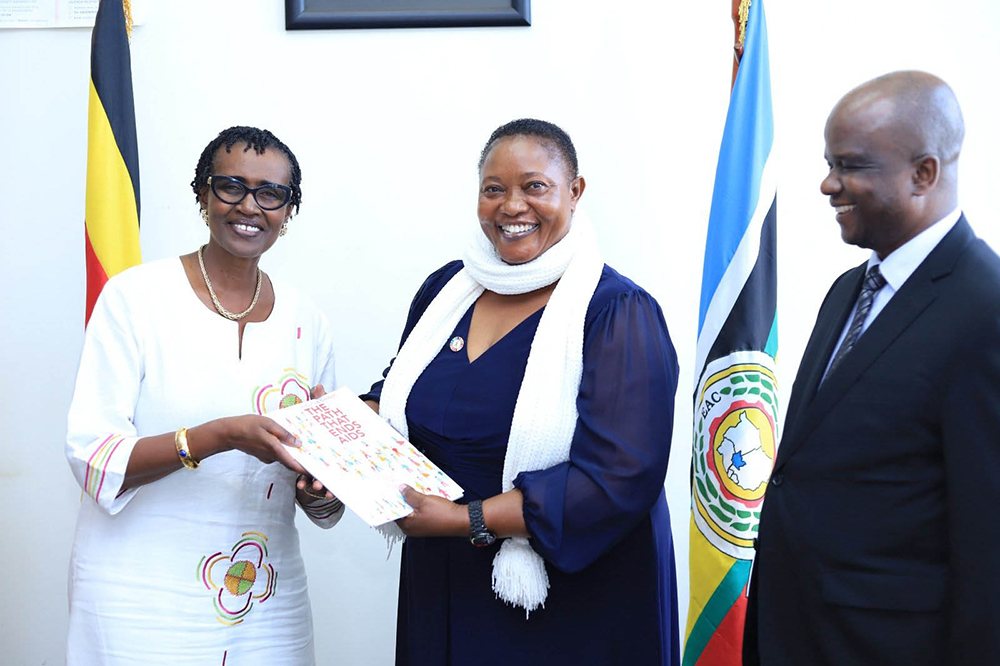Uganda can end AIDS by 2030, says UNAIDS boss
Sep 15, 2023
“The path to end AIDS is known. It will take political will to follow the evidence, let communities lead, respect human rights of everyone without discrimination and finance adequately,” Byanyima said.

(L-R) Executive director UNAIDS, Winnie Byanyima, Minister for the Presidency Milly Babalanda, and executive director of the Uganda Aids Commission, Dr Nelson Musoba. (Courtesy Photo)
Umar Kashaka
Journalist @New Vision
The executive director of the Joint United Nations Programme on HIV/AIDS (UNAIDS), Winnie Byanyima says she remains optimistic that Uganda can end AIDS as a public health threat by 2030.
“The path to end AIDS is known. It will take political will to follow the evidence, let communities lead, respect human rights of everyone without discrimination and finance adequately,” she said on Thursday (September 14) after meeting Minister for the Presidency Milly Babalanda at her office in Kampala.
In a post on X, formerly Twitter, Byanyima thanked the minister for her strong leadership on HIV, especially for convening district security and health leaders to sensitise them on how to ensure all Ugandans without discrimination access public health services.

The executive director of the Joint United Nations Programme on HIV/AIDS (UNAIDS), Winnie Byanyima pining Minister for the Presidency Milly Babalanda as Dr Nelson Musoba, the executive director of the Uganda Aids Commission looks on. (Courtesy Photo)
Babalanda also posted saying she had been honoured and pleasantly surprised to receive a medal from UNAIDS delivered by Byanyima in appreciation of her humble contribution to the fight against HIV/AIDS.
“Thank you, my sister, for your contribution as well,” she said on X.
She said in late 2022 that over 1,000 Ugandans were infected with HIV every week and about 325 people were dying weekly from AIDS-related causes.
According to Dr Nelson Musoba, the executive director of the Uganda Aids Commission, there were 1.4 million people living with HIV in the country as of December 2022.
Latest UNAIDS report
On June 13, 2023, UNAIDS released a report highlighting that ending AIDS is a political and financial choice and that the countries and leaders who are already following the path are achieving extraordinary results.
It said Botswana, Eswatini, Rwanda, the United Republic of Tanzania and Zimbabwe have already achieved the “95-95-95” targets.
That means 95% of the people who are living with HIV know their HIV status, 95% of the people who know that they are living with HIV are on lifesaving antiretroviral treatment and 95% of people who are on treatment are virally suppressed.
A further 16 other countries, eight of them in sub-Saharan Africa, the region which accounts for 65% of all people living with HIV, are also close to doing so, the report, titled ‘The Path that Ends AIDS’ said.
It said the number of people on antiretroviral treatment worldwide rose almost fourfold, from 7.7 million in 2010 to 29.8 million in 2022.
However, the report said AIDS claimed a life every minute in 2022. Around 9.2 million people still missed out on treatment, including 660 000 children living with HIV, it said.
Byanyima said in June that the end of AIDS is an opportunity for a uniquely powerful legacy for today’s leaders. “They could be remembered by future generations as those who put a stop to the world’s deadliest pandemic. They could save millions of lives and protect the health of everyone. They could show what leadership can do,” she said.

No Comment